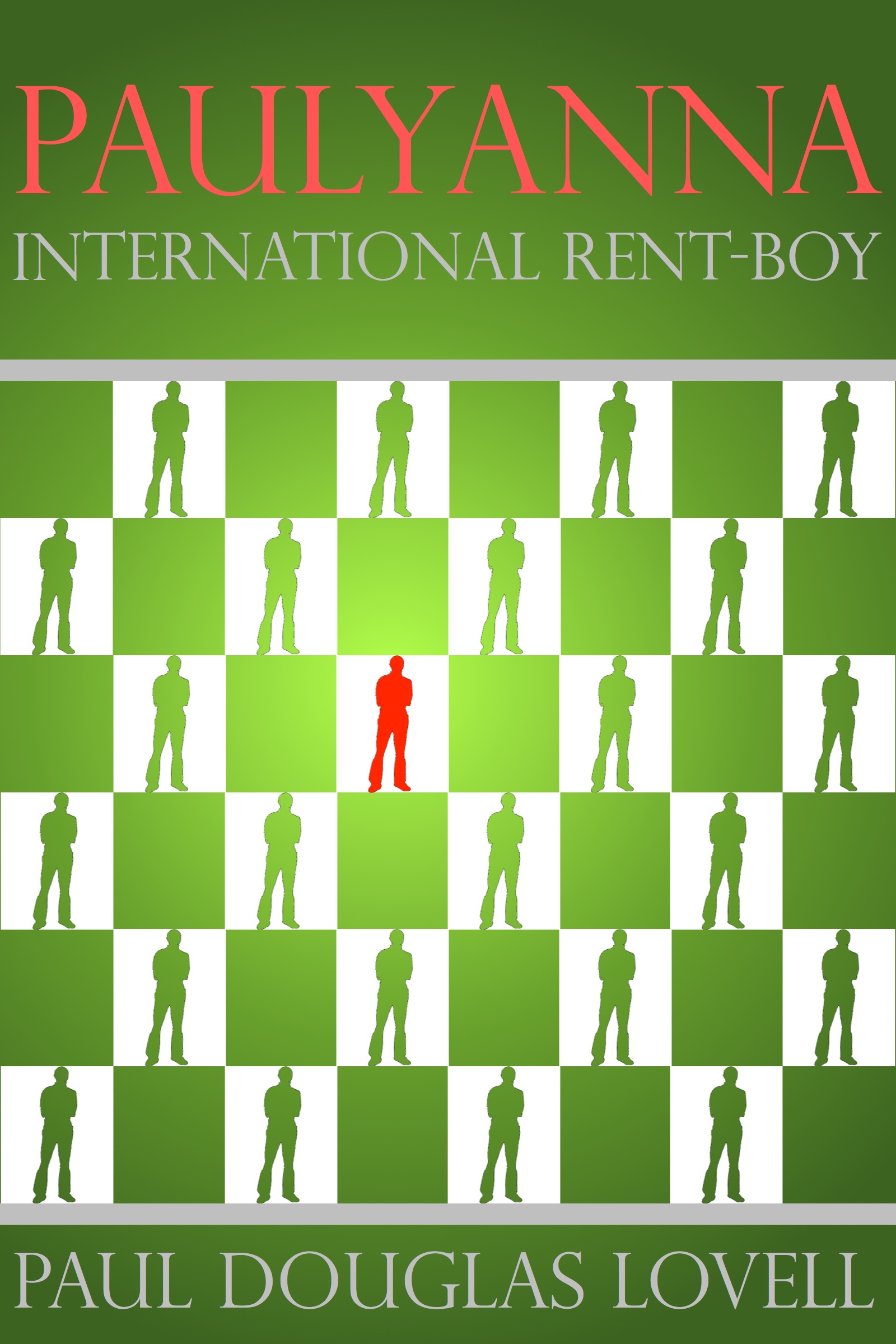The Book Farmer
Delightful and uplifting

I can’t believe it’s taken me this long to get round to reading this lovely book. It’s been waiting patiently on my Kindle for ages.
But better late than never, as they say. And so at last I’ve been able to enjoy Rebecca's excellent novel about Rachel’s experiences as a TEFL teacher in Greece. Anyone who’s ever lived or worked abroad, or thought about doing so, will revel in this story, with its ups and downs of foreign life, the faux pas and the frustrations but the endless fascination of discovering another culture. I’ve never been to Greece and so I eagerly soaked up every detail we get of all the places our heroine describes to us, and, of course, the people she meets.
There’s not only the geographical journey, there’s a spiritual journey too. Rachel feels that she has a point to prove to unsympathetic family when she undertakes a year of TEFL: that she’s independent and perfectly capable, thank you. But you do get the distinct feeling she’s not quite happy in her own skin at the start of the book, but by the end, when she’s the girl gone Greek, then she most certainly is. Greece is her spiritual home, the place where she can be who she’s meant to be. Through friendships and minor but significant triumphs at work, Rachel puts down her roots and blossoms.
It’s a delightful, uplifting book, full of sharp observations, humour and determination.
Delightful and Quirky
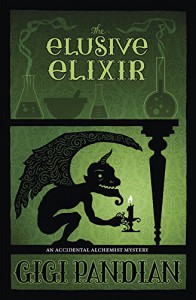
The Elusive Elixir is the third book in Gigi Pandian’s Accidental Alchemist Mystery series. The two previous books are The Accidental Alchemist and The Masquerading Magician. However, like I did, you can jump into the series here and still thoroughly enjoy the book. The author gives enough background details along the way, without ever info-dumping, for the reader to get up to speed with current events. I shall be reading the first two books now. I might be doing things backward, but with these books in which backward alchemy has such a part to play, then I feel justified!
The action takes place in Paris and Portland as Zoe Faust, our alchemist heroine who is somewhere around 300 years old having discovered the Elixir of Life, tries to find a cure to help her dear gargoyle friend Dorian from turning back into stone. She has to foray into the dark world of backwards alchemy, and places herself into considerable danger. Events and people from the past come back into her life to cause her rather a lot of trouble.
 This is a fabulously original book, and series, combining those formidable looking gargoyles of Notre Dame cathedral with alchemy. The author lends her own twist to the magic with her idea of backward alchemy, and the mysterious books of alchemy that Zoe is so eager to get her hands on. Zoe is a lively, interesting character, full of courage and initiative. Dorian is a wonderful counterpoint to her, with his, dare I say it, stereotypically slightly grumpy Frenchness and love of food! He’s irrepressible, even when facing such an uncertain future. Luckily he’s as resourceful as Zoe, as things don’t quite go the way she planned.
This is a fabulously original book, and series, combining those formidable looking gargoyles of Notre Dame cathedral with alchemy. The author lends her own twist to the magic with her idea of backward alchemy, and the mysterious books of alchemy that Zoe is so eager to get her hands on. Zoe is a lively, interesting character, full of courage and initiative. Dorian is a wonderful counterpoint to her, with his, dare I say it, stereotypically slightly grumpy Frenchness and love of food! He’s irrepressible, even when facing such an uncertain future. Luckily he’s as resourceful as Zoe, as things don’t quite go the way she planned.
There’s a fascinating cast of rounded characters all bringing their own action and interest to the story too, including Max, her calm, understanding boyfriend, and Brixton, her typical-teenager friend. There are secondary strands to the story making for a very rewarding, rich experience. It really is an absolutely delightful novel to read.
Lady Blues: forget-me-not by Aaron Paul Lazar
Lady Blues: Forget me Not is a Gus Legarde mystery, the tenth in the series. Although part of a series it works perfectly as a standalone book, although you will inevitably want to read more of these novels. This book is probably best described as a cozy mystery, although that might not do it full justice. There’s genuine tension and threat, edge of the seat stuff, and the characters have depth and interest to them, rather more than in some cozies. Yet our hero, Professor Gus Legarde, is such a comforting sort of person that we feel safe and secure in his hands, and that’s where the coziness comes in.
Gus is fifty-something, a professor, and lives with his second wife, his step-daughter, his ex-wife’s brother Siegfried, a variety of dogs, and his daughter and grandchildren are in the house too at the start of this story. There’s a strong supportive family atmosphere. Another guest, Lily, arrives, a Korean woman, after Gus and Siegfried pull her out of her burning house above the shop she runs with her brother Thom. He’s badly injured in the fire. And Lily has secrets to hide. That’s one strand of the mystery, and another stems from an octogenarian Gus meets when playing the piano at a nursing home. Music helps him remember, as do drugs, although possibly only temporarily, and one of the memories that comes back is of Bella, the woman he loved, his Lady Blues. Gus is determined to help him recapture his past before it’s all too late.
It’s hard to describe the story without giving away too much, but suffice it to say it’s intelligently and tightly written. So I’ll turn my attention to the writing. This is beautiful – evocative, startling, teasing, terse, soothing and suspenseful in turns. Author Aaron Paul Lazar has a wonderfully readable style, empathetic and gentle, but also frank and realistic. The characters he creates are fully rounded, flaws and all, and it’s hard not to be drawn deep into their world with them. Good food and music are recurring motifs throughout the story and so is the Genesee valley. There is so much to admire artistically in this book, and with a catchy cover and a very high standard of presentation, it is a perfectly presented piece of fiction. Very, very highly recommended.
Collector of Dying Breaths
The sense of smell is one of the more primal and powerful senses that human beings possess - a tantalising aroma is more than capable of subverting even the most focussed of minds just as it is capable of conjuring up vivid memories of scenes or moments long gone. And as Jac L'Etoile, heroine of M.J. Roses's book, “The Collector of Dying Breaths” is all too aware, scent and memory entwined can be as much a blessing as it is a curse.
Heiress to a perfuming empire, it becomes readily apparent just as to why Jac would rather follow her own path rather than tread in the family's footsteps: particular scents can cause vivid flashbacks into times long gone.
This ability becomes quite useful as the story of the book diffuses, as the plot takes us back to the 16th century court of Catherine de Medici, and more precisely to René le Florentin. He is not only one of the greatest perfumers of his age, but also the most dangerous in that he is a master poisoner as well as a perfumer; despite his protesting conscience.
The story begins in earnest once René's work is uncovered five hundred years later by Jac and sparks both passion and obsession in that René may have indeed discovered the secret of immortality, a veritable elixir of life that yet requires one very particular and exotic ingredient to be brought to fruition...
The story is a heady one; it is a thriller; well-written and believable with a powerful story with evocative descriptions of both perfumes and people diffused without. Well worth a read!

Confessions of a Paris Party Girl by Vicky Lesage
This book is an absolute delight from start to finish. But don’t read it – at least, not in a public place. It’ll have you smiling to yourself at the author’s light, lively smile, chuckling quietly at the faux pas, which are a normal part of expat life, that she shares with us and occasionally laughing out loud at the sudden ridiculousness of a crazy situation she finds herself in. And there’ll be the odd gasp of horror at the hair-tearingly-out stubbornness of French bureaucracy, and once or twice of admiration at our narrator’s partying stamina. People sitting in the airport terminal or doctor’s surgery around you shoot you looks of alarm and sidle quickly away from this clearly insane person giggling to themself!
Vicky Lesage shares the adventures of her early years in Paris, warts and all – and that’s what’s so wonderful. ‘Confessions’ is absolutely the right word to go in the title. The author doesn’t spare the French and she doesn’t spare herself. However, she only has a dig at French people when they deserve it, and is quick to admire all their good qualities, of which there are plenty. She’s less forgiving of herself, calling herself a ‘nerd’ now and again and worrying about her language skills. What she forgets to tell us is that Resourceful is her second name. There seems to be nothing she can’t cope with, and she tackles Paris head on – and wins!
We join Vicky as she finds friends, frustrations, places to live, fun, work, more frustrations and, on the way, the love of her life.
I honestly can’t think of anyone who won’t enjoy this book. If you’ve ever thought of going to France either to visit or to live, or even if you haven’t, you’ll get a sharp insight into what it’s like in this country. From the shopkeepers, who regard you as ‘Satan’s spawn’ because you want to pay with a €50 note, or, worse still, a credit card, to the fonctionnaires who always seem to withhold crucial information and thus complicate your life a million times more than it needs to be, to the bewildering number of public holidays, and finally to getting married there. Fabulous!
And as well as being a thoroughly brilliant book to read, it’s a showcase of good self-publishing practice. Here I put on my professional editor’s hat. We have the following:
· a classy, sassy cover
· an extremely well-written and well-presented text
· short, punchy chapters
· acknowledgements and table of contents at the end of the book: I wanted to dance when I saw that! Why? Well, these items take up valuable space in the free sample 10% or so that interested readers download when they’re considering buying an ebook. Given that an ebook opens at the last point you read to, you don’t need a contents list to find your page, so push that to the back. It’s there, but it’s not intruding, as are the acknowledgements. I’ve always advocated this approach but there’s been resistance. We’re too used to having these elements up front. Please, follow Vicky Lesage’s example!
· a chatty ‘about the author’ section, inviting us to review the book in exchange for a bonus story not in the book and to get in touch.
We have not only authoring, but indie authoring at its very, very best in this little gem of a book. It’s a self-publishing party in itself!
Nightmare in Burgundy - a dream to read
This is the third in the Winemaker’s Detective novel series, featuring Benjamin Cooker. This adventure sees him in Burgundy where, at the beginning of the book, he is given the honour of being named Chevalier du Tastevin by the Knights of this order, who have, as their slogan, ‘Never whine, always wine’!
The morning after he receives this honour, he is, not surprisingly, a little slow but is soon aroused to full capacity when he goes to inspect the graffiti that has appeared overnight in the country town Vougeot, where he’s staying. It inspires him since it’s in Latin, which isn’t usual for graffiti. Sadly, the locals think it’s young vandals, and two of them, the Mancenot brothers, shoot two teenagers whom they believe are responsible. Cooker, appalled by this vigilante justice, isn’t convinced they’ve got the right person.
An elderly friend of his, Brother Clément, helps Cooker determine what this Latin graffiti is all about. It’s a Psalm, and a rather foreboding one at that. Virgile, Cooker’s young and virile assistant, lends a hand too and the sleuthing begins in earnest.
Like its predecessors, this book is a wonderful combination of entertainment and education. We learn about wines, local folklore, history and, this time, some Latin. There’s suspense, suspicion, desperation, humour, lust and erudition. Benjamin Cooker displays his customary calm, loyalty and tenacity as he gets to grips with this definitely different mystery that faces him.
As you would expect from authors Jean-Pierre Alaux and Noël Blaen, there is some haunting imagery in this tightly-written, enjoyable novel. My favourite passage is: “In the distance, the massive silhouette of the Vougeot château seemed to be dozing in the middle of a burial ground of vines whose bony limbs and gnarled stumps were packed all the way to the back of the vineyard. A thick sky was brushing against the points of the tower where the crows were performing sinister and mocking spirals.”
If that doesn’t tempt you to want to read more of this book, then I’m not sure what will! 
Grand Cru Heist: set in the wealthy world of winemaking
Grand Cru Heist by Jean-Pierre Alaux and Noël Balen is best summed up, I think, as a cozy mystery for men set in the ostentatiously wealthy world of winemakers and connoisseurs. There is a definite feeling of Gentlemen’s Club in the novel with erudite discussions and witty wordplay amidst a haze of cigar smoke. The characters we meet definitely would definitely never confuse “a Bordeaux with a Burgundy”, which I’m not sure all we readers could!
Winemaker Benjamin Cooker is the victim of a carjacking in Paris. To recover from the unpleasant ordeal, he takes himself off to a rather nice hotel in Touraine to convalesce. Here he meets the British version of himself – Robert Morton, another man who likes his fancy motors and vintage wines. He’s also pulled into a murder when Morton’s young female companion is found dead, and shortly afterwards Cooker stumbles on another body. While this is going on, his friend Huber de Boüard, owner of the Château Angélus, is suffering from burglaries and receiving clever, cryptic messages from the thieves. Cooker throws his returning energy and intelligence into working out what’s going on in both cases. He certainly does seem more clued up than the investigator from the gendarmes, especially when it comes to European car registration numbers. With the help from his assistant, Virgile, Cooker gets to work.
The book is partly set in Bordeaux, without doubt the most beautiful city in France. (With my daughter at university there, I get to visit it every now and again.) If you know the city, but actually even if you don’t, you can really appreciate the descriptions of various parts of it that we find in the book. There are a few mentions of its history too. There is some lyrical writing (“The two pilgrims braved the west wind and the light rain that seeped into their bones, and for a while, they forgot their ages, their health, their ambitions, and perhaps even their own convictions”), and sharp observation (“Restaurants always seemed to be full of bored couples who enjoyed eavesdropping”). It’s tightly written, moves steadily and always with dignity, like Cooker himself, and is an intriguing mystery.
I’ve mentioned the Gentlemen’s Club atmosphere, and this is a predominantly male book. There are some women amongst its pages, although they do stay in the background. There’s rooker’s wife, Elisabeth, patient and loving, also a bossy nurse, a moody prostitute and an eye-catching waitress. They’re succinctly portrayed and, whilst minor characters, they’re certainly not shadowy.
There is some beautiful language. We get the lovely touch of the made-up term ‘Saint-Emillionnaire’ to describe someone who’s made a fortune from that type of wine. And I was delighted to see that Cooker’s dog is called Bacchus – I mean, what else! And according to our hero Benjamin Cooker, teetotalers are “A race of individuals not to be recommended…”, and the same can be said of the criminals Cooker helps to root out.
This is an enjoyable read. It’s quite a short book but, since it’s part of a promised series of twenty-two, then we can be consoled with knowing that there is plenty more entertainment coming our way from these two authors.
Tin Soldiers by M K Turner: fourth novel in a consistently excellent series
M K Turner’s Meredith and Hodge series, of which Tin Soldiers is the fourth, shows no signs whatsoever of running out of either originality or steam. It’s a real credit to this author that she turns out such consistently enjoyable and exciting novels.
Tin Soldiers opens with two young girls being lured away by a stranger. One of these girls is the daughter of Dave Rawlings, who’s on Meredith’s team of detectives, and emotions are running high. A homeless person, Peggy, has valuable information for Meredith and surprisingly she becomes a very close ally. Not only assisting with the case, she brings out more of Meredith’s softer side. We’ve seen him developing a lot during this series but he’s still able to surprise us.
Patsy too demonstrates how she’s learning to handle a personal life with Meredith, which he excels in making complicated, and her new career as a private life. However, contrasting the urgency of Meredith’s search for a child abductor with her own search for the probable but absent father of a baby, she questions how important her work is. It’s hardly life-changing, is it?
Nicola, Meredith’s ex-wife, reappears in this story, alongside the usuals of Meredith’s team and Patsy’s work colleagues of Chris, Sharon and Loopy Linda. We also meet foreign waiters, actors – both struggling and successful, dedicated doctors and troubled souls. M K Turner peoples her pages with fascinating characters from all walks of life and really brings them alive.
The plot as you’d expect is carefully constructed, ingenious and totally unpredictable. It keeps you guessing to the last. But not everything’s resolved for our main characters. We’re not sure what’s next for Meredith and Hodge but we definitely want to find out!
A book that's good fun and good for knitting's street cred: One Direction Knitting Pattern Exclusive
Boy band One Direction are turning into publishing as well as singing sensations. For the second year running their annual has been a bestseller (only pipped to the post by Minecraft in 2013) and there are lots of books about them.
And here’s another brilliant one. A book of knitting patterns so you can create your own Harry, Liam, Zayn, Louis and Niall and take them wherever you go! Or for your daughter or son, sister or brother, granddaughter, grandson, nephew or niece, or maybe even your mum or dad!
Band member Harry likes knitting so this book is great encouragement for boys to emulate their hero.
Knitting is cool these days, thanks to celebs taking up the pastime and to yarn bombers giving it a subversive element with their knitted graffiti, and so tweens and teens are OK to pick up needles and yarns. And with this book you won’t need to wrestle their tablet and phones out of their hands first. They’ll happily put them down to knit up a Zayn I’m quite sure.
The patterns are very straightforward and well explained. There’s a clear, concise ‘how to’ section and a list of the all-important abbreviations. The patterns use two-needle knitting, but more experienced knitters and fellow knitting-in-the-round junkies like me will quickly see how they can adapt the patterns to four needles if they wish.
The legs double as the trousers for each of the boys, and the shoes are the feet, but each band member has an add-on separate jacket or jumpers. There’s a hoodie, a jumper and a cardi for three of the lads and a template to make a felt jacket for the other two. This pattern again is very well explained. And the individual hairstyles are inspired! So often hair has been the downfall of knitted toys, and hand sewn ones too, usually a bit thin and ratty. Well, Carol Meldrum has it cracked for her little popstars. These are really a great touch.
The patterns use fingering yarn (sock yarn) which is ideal for their size as the small stitches aren’t too clumpy and clumsy for the figures. They also provide a good opportunity for you to use up any small balls of leftover wool in your stash.
Each boy takes a few hours to make (from a couple for a speed knitter to around four or so I’d estimate for a newbie) which makes this an easily achievable, morale-boosting project. And if you make one, then you just have to make the others so this will mean young knitters will see the project through, learn some skills, get a great sense of achievement and a fun end result that their non-knitting buddies will be envious of. This book is a great thing for not just One Direction fans but also for knitting’s street cred.
A Roma Rollercoaster: The Last Gypsy Princess by Alan A Larson
This talented author has followed up his stunning debut novel, Mexizona, with another incredible piece of fiction. The Last Gypsy Princess, the first in a trilogy you’ll be delighted to hear, is a fast-paced thriller set in the Roma community. Zee Ziko is the feisty, resourceful heroine. Her grandfather is a very powerful figure in the Chicago kumpania. However, he has never spent much time with Zee and certainly never readied her for the responsibility of leading the Kumpani, a role which he now plans for her following the death of the leader of the rival Martinov family. He feels guilty as Zee suddenly finds herself facing very real threats to her life, but luckily he has a very sharp, resourceful granddaughter.
As well as keeping us riveted to the pages, the book introduces us to Roma culture and beliefs. Curses and spells carry as much power as guns amongst the community. Dutiful obedience is expected by the senior members of the Kumpania. This norm is to test Zee almost to breaking point.
You can see why this book is going to be transferred to the big screen. It’s full of action, is original, has a fascinating cast of charismatic characters, both good and bad, and keeps us guessing all the way through. There’s romance, violence, tension, celebration, hope and despair, but above all a unique and empathetic heroine who carries this amazing story along.
It’s a brilliant read.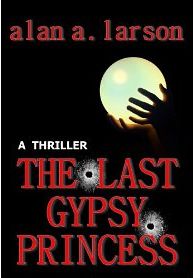
Think again about French literature
The Paris Lawyer by Sylvie Granotier is an absorbing and enjoyable novel. If you’ve never read French literature before – and many of us haven’t, a fact greatly begrudged by French writers who suffer from being tarred with the same brush as French cinema which, rightly or wrongly, is famous for being depressing and boring – then this is a good book to start with.
Heroine Catherine Monsigny has fleeting memories of the murder of her mother, which happened when she was a toddler. This happens in the quiet, rural département of Creuse (my home). She is now a dedicated and ambitious lawyer in France, travelling to her cases on her scooter and living an independent life. However, she is called back to the Creuse, to the very same area where her mother was killed, to deal with a case involving Myriam Villetreix, who is accused of poisoning the rich man who married her to save her from deportation.
Not surprisingly, returning to the scene of her childhood trauma stirs up painful memories for Catherine. She becomes deeply concerned with discovering more about her mother, believing this will help her understand how she herself us. It is thus a multi-layered novel. There is contrast between bustling, pressured urban Paris and the usually peaceful, relaxed atmosphere of Creuse. You couldn’t find two more different areas of the same country. There is also contrast between Catherine’s need to find out the truth about her mother, to bring things to the surface, and her father’s desire to keep the past well buried. Fabulous.
It is difficult to say a great deal about this story without giving too much away. It is part psychological thriller, part self-discovery, part crime fiction. It is peopled by rounded, compelling characters, brilliantly structured and a gripping, rewarding read.
Café Insomniac by Mark Capell: what is real and what is imaginary?
How well can you trust yourself? No matter how you cut it, you cannot. Your eyes can see things that are not present; you can hear things that you should not. Hallucinations are omnipresent, and in reading Café Insomniac you too will find yourself wondering what is real and what is imaginary, as the lines between real and unreal blur to a greater and greater extent.
Such is the predicament of Justin, insomniac and latterly a latte-serving ex-teacher in charge of the titular Café Insomniac, a co-venture with his father. The premise of Café Insomniac is self-explanatory - it is a café, open all night and ready to dispense caffeine and pastries to those who find themselves burning the midnight oil or otherwise unab le or unwilling to receive a visit from the proverbial sandman.
le or unwilling to receive a visit from the proverbial sandman.
However, things are not quite as they seem, as the sleep-deprived protagonist finds himself drawn into an unnerving series of events of worsening insomnia, seemingly sparked by a murder of one of his patrons. The insomnia soon becomes a total inability to sleep, and as Justin finds his reflexes duller and duller and the imaginary harder and harder to distinguish from the unimagined, things become stranger and stranger and the normal becomes unnerving. Can Justin get to the truth of the matter and save his sanity, or was he never really sane to begin with?
The book is a definite change of pace from anything else on the market at the moment. It sends the reader into an uncanny valley where things seem normal, but not quite. There is an undercurrent of just something strange to each sentence, each paragraph. As the plot progresses, the strangeness becomes a little bit more pronounced, just a little more, until you find your skin crawling as the writing crosses into something mildly, yet fundamentally, unnerving.
Mark Capell is a fluent word-smith to craft a work with such a profound effect on the reader. When the book is not attempting to rattle the reader, the descriptions of the characters and places are down to earth and can be related to, while at the same time keeping you just ever so slightly off-balance and continuing the ever-so-slightly unsettling narrative.
In keeping with the book’s departure from the market norms, the plot lends itself to the atmosphere. It is undeniable that it is a slow build-up all the way through, and yet it complements the tiredness of Justin and the fogginess of his mental state.
All in all, I highly recommend this book. It captures the confused and unsure mental state of anyone who has found themselves awake in the small hours of the morning, eluded by sleep and groggily fumbling with reality to try and find out just what is going on around them. As a little bonus, the author also proposes, on his website, a playlist of songs that appear in the book itself and which compliment the ambiance of the story. So tune in, read on and try not to slip away...
The Cancer Code: a scientific thriller that's maturing nicely
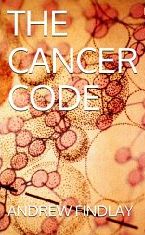 When you think of wine, you don't, as a rule, think of cancer. You think of vineyards basking in the golden rays of a setting sun, of cool cellars and oaken casks, of the complex yet concentrated of a good red wine. And it is becoming evident that wine, red wine in particular, might actually have some beneficial effects on our health, alcohol notwithstanding.
When you think of wine, you don't, as a rule, think of cancer. You think of vineyards basking in the golden rays of a setting sun, of cool cellars and oaken casks, of the complex yet concentrated of a good red wine. And it is becoming evident that wine, red wine in particular, might actually have some beneficial effects on our health, alcohol notwithstanding.
Enter Jim Macwade, a winemakers' son who delved into the scientific world rather than labour on the family' estate. The first impression of Jim is not in the most glorious light: Jim is a reclusive and resolute researcher working for a pharmaceutical giant, GluckSchmidtLittle. Snubbed by a past love, Jim devoted himself entirely to science, slaving feverishly with the virtually unlimited resources provided by his employers while also drawing deep on his personal knowledge of the background of wine-making and even his own personal ingenuity, working on that 'Holy Grail' of cures, a cure for cancer. And with the properties of Resveratol and after much hard work, the cure is created.
But all is not well in paradise- Jim found the cure while working on his own free time rather than company hours. Jim also realises the full ramifications were he to hand over such a silver bullet to the arsenal of GluckSchmidtLittle, especially given the cheap production costs of such a miraculous cure and the killing that a pharmaceutical giant could make from such a drug; both metaphorically in terms of the money-making and the access or denial to such a cure. Jim takes matters into his own hands and flees, embarking on a desperate manhunt with himself as the target; and at the same time a profound soul-searching on the road, with truths becoming revealed concerning his companions rather than compounds.
The book makes for a fast-paced thriller without skimping on the actual science behind cancer and Resveratol itself; the compound may be fiction but the author has clearly gone to great lengths and greater pains to ensure that the science fiction is based on science fact. Granted, the multi-syllabic technical terms might not be to everyone's tastes, but the dense science terms explaining the cure and its effects mesh perfectly with the frantic pace of the manhunt launched by a ruthless corporate giant, of the disturbing agents sent to retrieve the data on cure with no holds barred and no concern to Jim's safety or well-being.
Cancer Code is a thoroughly enjoyable read for anyone who enjoys a thriller worthy of the name coupled with the engrossing details behind the source of intrigue. And, like any wine, this book is to be savoured, shared with good friends and preciously guarded on an oaken bookshelf rather than an oaken barrel.
Cheers!
Review for Paulyanna
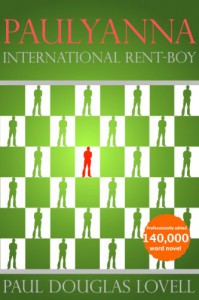
 A modern, entertaining, upbeat memoir
A modern, entertaining, upbeat memoir
28 septembre 2013 Par S. J. Dagg
It couldn’t be better timed that Paulyanna: International Rent-boy by Paul Douglas Lovell has been published exactly 100 years after Pollyanna (by Eleanor H Porter) first hit the literary scene. And yes, Paulyanna, coined by one of Paul’s friends, is a clever adaptation of Pollyanna. Paul is Pollyannaish through and through. And that’s a real word – Pollyannaish. It’s in the dictionary. (Check if you don’t believe me!) It means someone who’s incorrigibly optimistic and upbeat. And that’s what Paul is.
Paulyanna follows Paul through early adulthood as he begins to make his way in the world. Emerging from an underprivileged childhood in the Midlands, Paul heads to London to take up his first job as a kitchen porter. He’s delighted to be in the city, where he’s free to be himself – to be independent and to express his sexuality. From portering he moves on to barwork and later a responsible job in the music TV industry, but increasingly he comes to rely on his alternative career as a rent boy to support him.
A character himself, with his strength of personality, slightly unconventional interpretation of the Catholic faith and strong belief in karma, Paul encounters some equally fascinating people along the way. Some are good, generous and sympathetic, others less so. Others, such as his friend Richard whom he calls his ‘partner in crime’, are a bit of both. He travels to Spain, Holland and America and his amazing eye for detail really comes into play here in his depictions of the appearance and atmosphere of the places he visits.
Drugs, streetlife, friends succumbing to Aids, loneliness – there’s a tough, gritty element to the book but the overall impression is of hope and cheerfulness. The Pollyanna in Paul won’t be beaten. As you read the book you’re rooting for things to turn out well for Paul who doesn’t ask for much – a settled loving life with a husband and a dog – so when the dark, handsome Michael turns up, you’re holding your breath. Will he be the one to cement Paul’s happiness?
The book is so well written. Paul’s style is easy to read, ranging from the poetic to the pithy. He’s a great companion through the pages of the book. This is a thoroughly modern, entertaining memoir that I recommend to everyone.